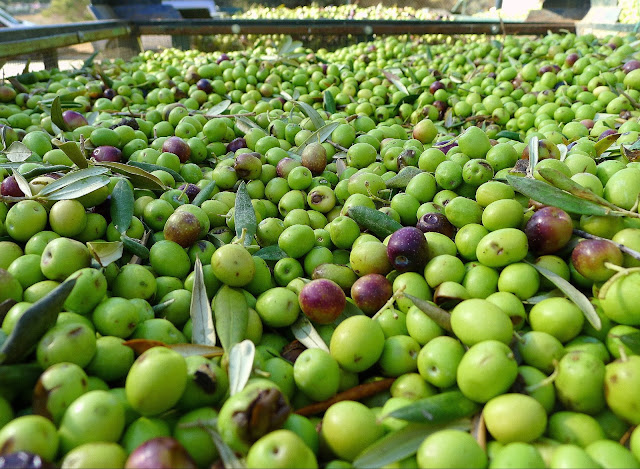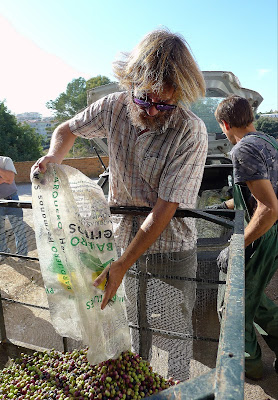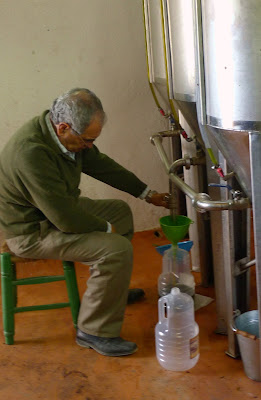 |
| First, pick the olives. Get them to the mill as soon after picking as possible. That way, they maintain their freshness and fruitiness and produce the finest virgin oil. |
 |
| Unloading six sacks of my olives at the mill. This mill is a small, family run business only a few miles from where I live. Originally established in 1920, it stopped functioning in the early 1960s. Five years ago, the four Ayala brothers who own it decided to put the mill in working order again. |
 |
| A fork-lift loader moves my bin of olives to the loading chute. A week's worth of picking looks like nothing in that bin that holds 500 kilos! |
 |
| Off they go, olives on the way to becoming oil. |
 |
| First step, the olives are tumbled and air-blown in a hopper to remove leaves and dirt. Large scale growers usually down olives by vareo, thrashing the branches with sticks and gathering the fruit in tarps spread on the ground. Inevitably, leaves and twigs accumulate with the olives. I hand-pick olives, ordeñando, or "milking" them off the branches. So my
olives are especially clean. Sometimes the jefe decides they don't need
the leaf-blower. The olives drop into a bin that functions as a scales. | | |
 |
| Weight: 127 kilos ((280 pounds). |
Harvesting of olives seems to begin earlier every year. Two factors are at work here. One, yes, global warming. The fruit matures earlier. As soon as the first rains plump the olives (October), they are ready to pick, green and fresh. Also, early milling makes superior virgin oil.
Virgin olive oil is oil that has been extracted solely by mechanical means--crushing and pressing, without the use of high temperatures or chemical disolvents that alter the oil's composition. It is almost the only oil that can be consumed without further refining.
 |
| The next step, the olives are crushed to release the oil. This is the old way for molturación, with grinding stones. It is no longer used at this mill. "Not efficient," said the owner. |
 |
| Instead, olives go into this machine to be ground up by spinning steel wheels. |
 |
| This is an old-fashioned olive press. The ground-up olive pulp is spread onto mats, woven of esparto grass or of polyester synthetics. These are stacked on the hydraulic press, which squeezes the pulp tighter and tighter, allowing the oil to flow out through channels at the bottom. This mill no longer uses this press, except for special orders. The reason these presses have fallen into disuse is that they produce less good oil. The mats must be scrupulously cleaned in order to prevent residue from causing rancidity and off flavors in new oil. |
 |
| Jesús Ayala monitors a modern olive oil extraction machine. The crushed olives are spun at high speed to separate the oil from the water. Forget that old phrase, "cold-pressed oil." Almost all olive oil in this day and age is extracted by a centrifugal process. Big cooperative factories have huge ones. This mill has a small one. During the milling season, the Ayala brothers run it seven days a week. |
 |
| Straight from the centrifugal extractor, new oil pours out. Fresh-squeezed olive juice. |
 |
| This oil is unfiltered. After settling a couple of weeks, it will clarify quite a lot. |
 |
| Modesto Ayala figures out how much I've earned. I could take the money--hardly enough to buy lunch! But, I want the oil. Fifteen liters, he tells me. This is not from my own olives--I don't have enough olives at one time for the "run of the mill" (500 kilos). Working by myself, with a little help from son and grandson, I can't pick enough in one week to make up the minimum. |
|
 |
| Labels applied by hand. |
 |
| No automated bottling here. |
 |
| Ben and Leo load three 5-liter jugs of oil. I'm up to 35 liters now and still more olives to pick! Hopefully, we'll finish by next week. |
 |
| The olive mill of the Ayala family is located in Campo de Mijas (Málaga). |

















Thank you for a most interesting article on how we obtain olive oil! The pictures were great too! 280 lbs. of olives!?!? Yikes, that's a lot of olives! How many trees do you have?
ReplyDeletePatty: 18 trees. They don't all produce every year, but this year they are loaded! Still more to pick!
Delete